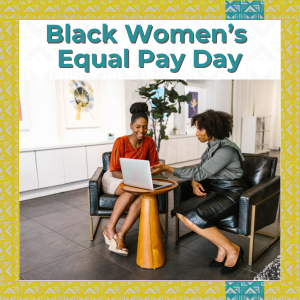On July 27, we observed Black Women’s Equal Pay Day, the date in 2025 when Black women’s earnings finally catch up to what white, non-Hispanic men made by the end of 2024. This marks nearly 208 extra days of labor just to earn the same pay. But the significance of this day extends well beyond dollars and cents. It is a stark reminder of the systems that continue to undervalue Black women’s labor, leadership, and lives. And this year, that reality feels more painful and profound than ever before, as we confront a coordinated rollback of the very equity gains, we’ve spent decades fighting for.
Black women earn just 66 cents for every dollar paid to white, non-Hispanic men. Contrary to popular belief, this gap doesn’t narrow with increased education, experience, or seniority. On the contrary, it often grows. Over the course of a 40-year career, this disparity adds up to more than $900,000 in lost income. That’s nearly a million dollars in wealth stripped away, money that could have gone toward homeownership, a child’s education, healthcare, or retirement. This isn’t just a gap; it’s economic extraction, built on a foundation of systemic neglect and the historic devaluation of Black women’s worth.
In the wake of George Floyd’s murder, institutions across the country, governmental and corporate alike rushed to expand Diversity, Equity, and Inclusio n (DEI) initiatives. Black women stepped into these roles in record numbers, holding more DEI positions than any other demographic group. For a brief moment, there was a visible commitment to addressing structural inequality. But now, as political winds shift, those same positions are being eliminated, and Black women are once again the first to be let go.
n (DEI) initiatives. Black women stepped into these roles in record numbers, holding more DEI positions than any other demographic group. For a brief moment, there was a visible commitment to addressing structural inequality. But now, as political winds shift, those same positions are being eliminated, and Black women are once again the first to be let go.
Following 2020, DEI-related job listings rose by 123%, and the number of Chief Diversity Officer hires nearly tripled by early 2021. But the tide quickly turned. By early 2023, DEI job attrition rates had already doubled compared to other roles. With the signing of Executive Orders (14151 and 14173) in January 2025, federal agencies were instructed to dismantle all DEI programming, closing DEI offices and terminating staff in masses.
Black women have borne the brunt of these decisions. In April 2025 alone, 38,000 Black women lost their jobs. That same month, an additional 106,000 became unemployed, raising the unemployment rate for Black women from 5.1% in March to 6.1% in April the largest spike among any demographic. Experts directly link this surge to the dismantling of DEI infrastructure in both public and private sectors. Bloomberg reports that Black women’s representation in federal jobs dropped by roughly 33% over the past year, despite the fact that they held a majority of positions in some of the very agencies targeted by these cuts.
Black women have long been central to our nation’s moral and social progress. We have led movements, educated generations, organized communities, and carried burdens that were never ours alone to bear. And yet, when DEI is politically inconvenient or financially expedient to abandon, we are the first to be dismissed. Our leadership is undermined. Our work is devalued. Our voices are silenced. But we are not tokens. We are not checkboxes. And we are most certainly not collateral damage in anyon e’s ideological war.
e’s ideological war.
Honoring Black Women’s Equal Pay Day must go beyond symbolic gestures or awareness campaigns. It demands tangible, bold action. We need meaningful reinvestment in Black-led institutions and the women who lead them. We need legal and structural protections that guarantee transparency and equity in hiring, pay, and promotions. We need to defend DEI work at every level with steadfast public accountability and legal safeguards. And we need philanthropy that does not falter in the face of political pressure, but instead boldly centers racial and gender justice as core, non-negotiable values.
Equity is not a trending topic; it’s a daily moral commitment. One that requires intention, courage, and unyielding solidarity.
This conversation is not just about income. It’s about power. And as history has shown us, power is never ceded without a fight. The recent wave of anti-DEI sentiment, policy rollbacks, and economic disenfranchisement facing Black women is not isolated, it is a deliberate strategy of suppression. Our response must be just as coordinated, just as bold, and just as relentless.
Let us rise, not simply to name the injustice, but to organize against it. Let us build power, not plead for inclusion. Let us do it together and let us do it now!
By: Wendy Armour


